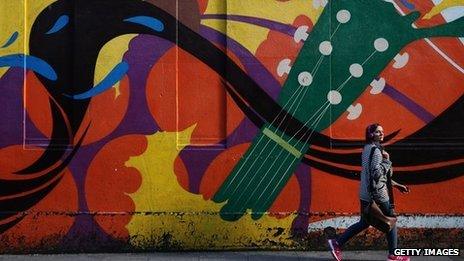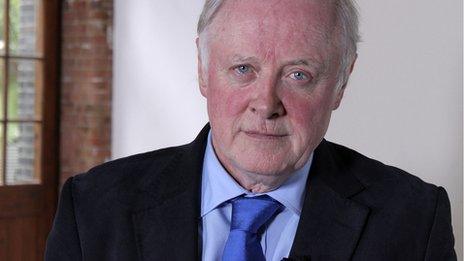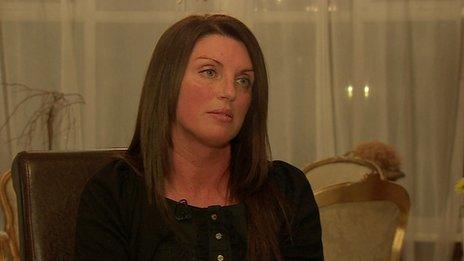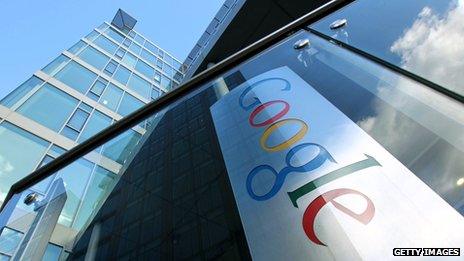Is Ireland's economic hangover really over?
- Published

Every week, some 1,000 people leave Ireland to find work overseas
"There was a brashness and preoccupation with wealth that rested uncomfortably with the Irish psyche," says businessman and corporate turnaround expert Sir Gerry Robinson of his country's boom years.
The Donegal-born former chief executive of Granada TV and drinks giant Allied Domecq feels that the economic crisis from which Ireland now finds itself emerging might have been anticipated by many people.
"Some of the more fundamental things that mattered in life were being eroded," he says.
"We were driven by the quick buck.
"And now there's a sense that something was missing. I guess there's a kind of Catholic mentality - an understanding that they would have to pay for all this."
And pay for it the Irish certainly have.
Since the 2008 crisis, unemployment has risen to 15%, GDP has crashed by a fifth and debts have soared.

Businessman Sir Gerry Robinson says Ireland's boom years saw a brash preoccupation with wealth
The Republic of Ireland is one of the most indebted countries in the developed world, with a quarter of mortgages at least three months' in arrears.
Mandy Freeman is a specialist theatre nurse in a major Dublin hospital. Her public sector take-home pay has been cut by a fifth but her huge mortgage has not and now she has to pay for her two daughters' university costs.
'It's been very difficult'
She describes herself as one of Ireland's new 'working poor'.
"I do feel I've been robbed of the years where I worked up the ladder and now I'm on the same wage as I was seven years ago," she says.
Ireland's GDP may now be rising and unemployment may be falling, as are government borrowing costs, but Mandy is one of many who say they have not yet felt the warm glow of this recovering economy.
"It's been very difficult for people on mortgages and young families, people in the education sphere and the health area," says the Irish prime minister, Taoiseach Enda Kenny.
That Ireland is growing at all is something of an economic miracle, and Mr Kenny himself describes what happened to the country in 2008 as "catastrophic".

Nurse Mandy Freeman says her wages have been cut by 20%
Low business taxes
Irish banks loaned billions of euros to anyone and everyone on the premise that property prices could only go up.
When the wholesale money markets folded, Ireland's economy collapsed.
Since then nearly €20bn (£16.7bn) of spending cuts and tax rises have been introduced and foreign investment has continued to flow inwards.
This is because Ireland was and remains one of the most open, business-friendly economies in the world - with a young well-educated workforce.
Foreign firms "find the supply of labour a good place to be - they find Dublin, Cork and Limerick good places for industry to be based," says Frances Ruane of the economic think tank ESRI.
Importantly, taxes on profits for all companies, domestic or global, stand at only 12.5%.
It has helped to attract the world's biggest names in technology - Facebook, Google, Twitter and AOL all have major operations around Dublin.
'It seems very strange'
And crucially for the nation's sense of sovereignty and self-belief, next month Ireland is set to exit the €85bn international bailout programme it entered three years ago.

Ireland's low tax rates have encouraged inward investment
But for most people who don't work in the tech sector, like Mandy Freeman, if they've kept their jobs they have had an economic migraine for the past five years - with big cuts in take-home pay.
"We used to go to the cinema once a month as a family and try and go out for a meal, but they aren't really options any more. It's just too expensive," she says.
For many others, emigration has been the safety valve, which has kept Irish unemployment from reaching Spain's heady heights.
Whereas historically it was the uneducated who left, now 1,000 well-educated young people are taking their talents overseas every week.
Most are leaving because they cannot get the right kind of work in a feeble domestic economy.
Robert Byrne, aged 21, is a psychology undergraduate from University College Dublin (UCD), Ireland's largest university. He wants to work in a hospital but the crisis has seen the public sector shrink, so he is bound for Australia or New Zealand.
"It seems very strange because I grew up in an environment when everyone thought the Irish economy was the best thing ever.
"But unfortunately in the last five years we've seen that it was not sustainable.
"It is upsetting to feel that I have to actually leave the country and leave behind my own family," he says.
In a BBC-arranged debate among UCD students, well over half said they intended to emigrate. Yet asked if they were optimistic about their futures, 90% raised their hands.
'You respond by going'
Watch Joe Lynam's Newsnight film in full
Perhaps that is the dichotomy of the Irish psyche; resilient, optimistic, yet fatalistic in its world view.
"Maybe there is a kind of inbuilt expectation that even when things are going quite well, it's not going to last," says Fintan O'Toole, of the Irish Times.
"The Irish have never really had a huge amount of faith in their country, or the British empire which ruled them before that.
"So how do you respond to hard times? You respond by going, by getting out of the place and by trying to survive on an individual basis rather than by changing society itself."
One thing that could keep spirits up and emigration down is a thriving economy, and you get the sense that with a fair wind - economic resurgence in Britain and the eurozone - Ireland could be set to recover rapidly.
After a 15-year party and a five-year hangover, perhaps the Irish might not need as much aspirin in the coming years.
- Published7 November 2013
- Published7 November 2013
- Published28 October 2013
- Published15 October 2013